Award-Winning Chicago Personal Injury Lawyer - Securing Justice
for Illinois Injury Victims - Over $450 Million Recovered
Bed sores, also known as pressure ulcers or decubitus ulcers, are often a clear sign that a nursing home facility has failed to provide proper care. Our experienced Chicago bed sore lawyer team has built a strong track record of holding negligent facilities accountable and helping families secure meaningful compensation.
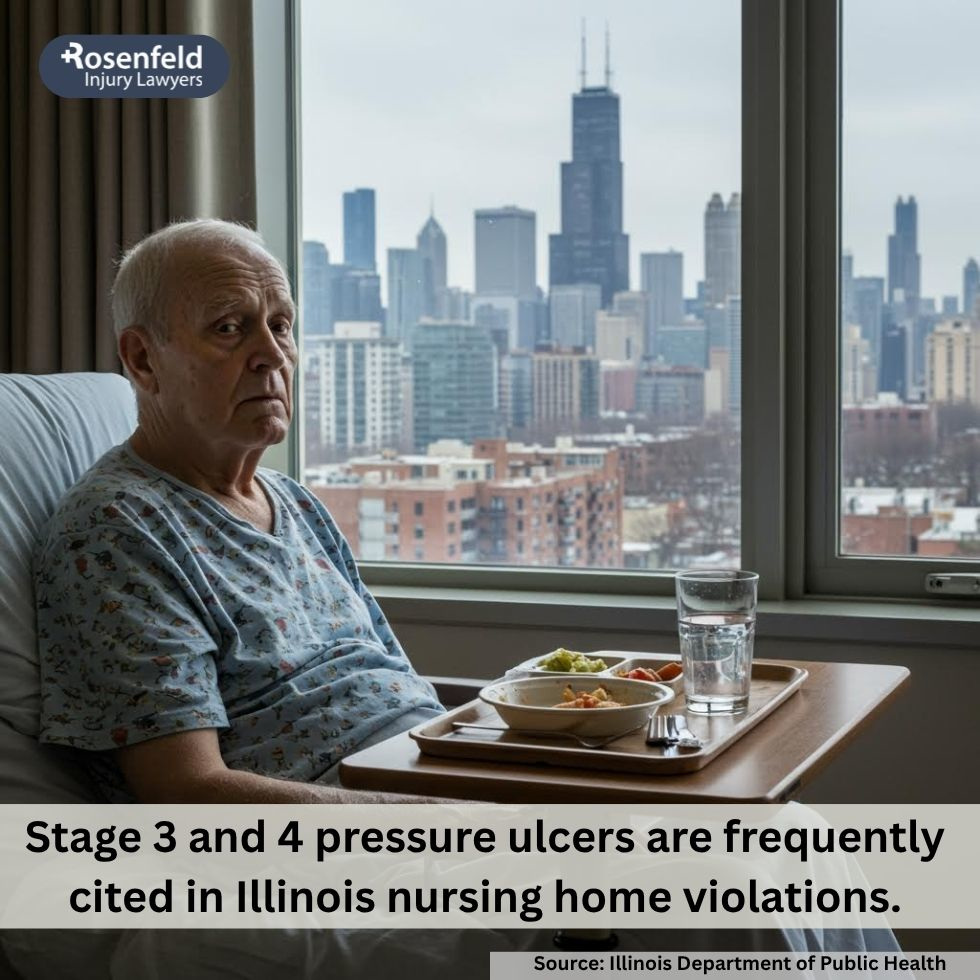
$12,800,000 Verdict – Mary, an elderly woman with limited mobility, developed severe, untreated bed sores while under the care of a South Side Chicago nursing home. The bed sores progressed to a deadly infection. Evidence showed repeated failures by staff to provide basic care. The jury awarded $12.8 million for her suffering and wrongful death.
$3,245,000 Settlement – James, 72, entered a Chicago-area long-term care hospital for stroke recovery. During his stay, staff failed to reposition him or monitor skin integrity, leading to multiple bed sores. The resulting tissue damage required extensive surgical treatment. His case settled for $3.25 million based on severity and extended medical care needs.
$2,150,000 Settlement – Gloria, a resident at a North Side long-term care facility, developed bedsores that went untreated for weeks. The wounds became infected, ultimately leading to sepsis and death. Medical records showed clear signs of neglect by the nursing home staff. Her family received $2.15 million in a wrongful death settlement.
At Rosenfeld Injury Lawyers, our Chicago nursing home abuse lawyer team is known for holding nursing homes accountable when residents suffer from preventable pressure sores. We’ve built a reputation for results, integrity, and standing up for elderly individuals harmed by neglect. Our attorneys are recognized by Super Lawyers, the Million Dollar Advocates Forum, and maintain a 10/10 rating on Avvo.
With over $450 million recovered in verdicts and settlements, including many involving severe bed sores and wrongful death, our law firm brings deep experience and tireless advocacy to every case involving nursing home abuse.
Bed sores, also known as pressure ulcers or decubitus ulcers, develop when prolonged pressure cuts off blood flow to the skin and underlying tissue. These wounds are classified into four stages based on severity. Early recognition and proper treatment are critical to prevent serious complications or death.
Stage 1 bed sores involve skin that appears red, warm, or discolored but hasn’t broken open. The area may feel firm or painful to the touch. At this stage, pressure relief and prompt care can stop the sore from worsening. Elderly individuals with limited mobility are especially vulnerable.
At stage 2, the skin breaks open or forms a shallow ulcer. The area may appear as a blister or scrape and often causes noticeable discomfort. This stage indicates the skin has already been damaged, and without immediate medical attention, it may progress to deeper tissue injury.
At stage 3, bed sores extend into the underlying tissue beneath the skin, creating a deep, open wound. Fat may be visible, and the affected area is at higher risk for infection. Serious intervention is required to treat the wound and avoid life-threatening complications like sepsis.
Stage 4 bed sores are the most severe, involving extensive damage that may expose muscle, tendons, or even bone. These wounds can lead to permanent disability or death. Prompt surgical care, aggressive wound treatment, and infection control are often necessary at this stage.
At Rosenfeld Injury Lawyers, we’ve handled numerous bed sore cases in the Chicago area, and we’ve found that these injuries usually point to deeper problems within the assisted living facility.
Bed sores typically develop when staff fail to provide proper care, often due to understaffing or poor training. When nursing home staff are stretched too thin, basic tasks like repositioning residents, changing bedding, or monitoring skin conditions are skipped. Neglect is rarely isolated; a Chicago Nursing Home Fall Lawyer often discovers that facilities failing to prevent pressure ulcers are also negligent in fall prevention, just as a Chicago Nursing Home Dehydration Lawyer may find that poor fluid intake has made a resident’s skin more susceptible to breakdown. This neglect can quickly lead to severe tissue damage.
Another major factor is the failure to follow a resident’s care plan. These plans are in place to prevent bedsores, especially for nursing home patients with limited mobility or other medical conditions. When ignored, the risk for developing bedsores rises sharply.
We’ve also seen facilities hire unqualified staff due to poor background checks or rushed hiring practices. Combined with high staff turnover, this leads to inconsistent care. Without supervision or accountability from the administration, minor lapses turn into serious injuries. In many cases, corporate owners prioritize profits over safety, leaving nursing home residents vulnerable to harm.
As experienced Chicago nursing home bed sore lawyers, we work to recover damages that reflect the full impact of these preventable injuries. Medical costs are often significant–ranging from hospitalization and wound care to surgery and long-term rehabilitation. In advanced cases, pressure sores may require ongoing treatment for months or even years.
Victims are also entitled to compensation for pain and suffering. Bed sores can be excruciating, especially when they reach deeper tissue or become infected. The emotional toll is also real. While a Chicago Nursing Home Broken Bone Lawyer focuses on the trauma of fractures, our firm also recognizes that immobile residents are at extreme risk for systemic complications, requiring a Chicago Nursing Home Infections Lawyer to address cases where untreated skin lesions lead to life-threatening bacterial spread. Many nursing home residents feel shame, anxiety, or depression after developing bedsores, particularly when those injuries are ignored by staff. These psychological effects are just as damaging as the physical wounds.
Residents who lose mobility or independence due to bed sores experience a reduced quality of life, and that loss is compensable. In the most serious cases, where untreated bed sores lead to death, families may pursue a wrongful death claim to recover funeral costs, grief-related damages, and loss of companionship. Our law firm builds strong cases using medical records, expert evaluations, and facility documentation to ensure victims and their families receive fair compensation.
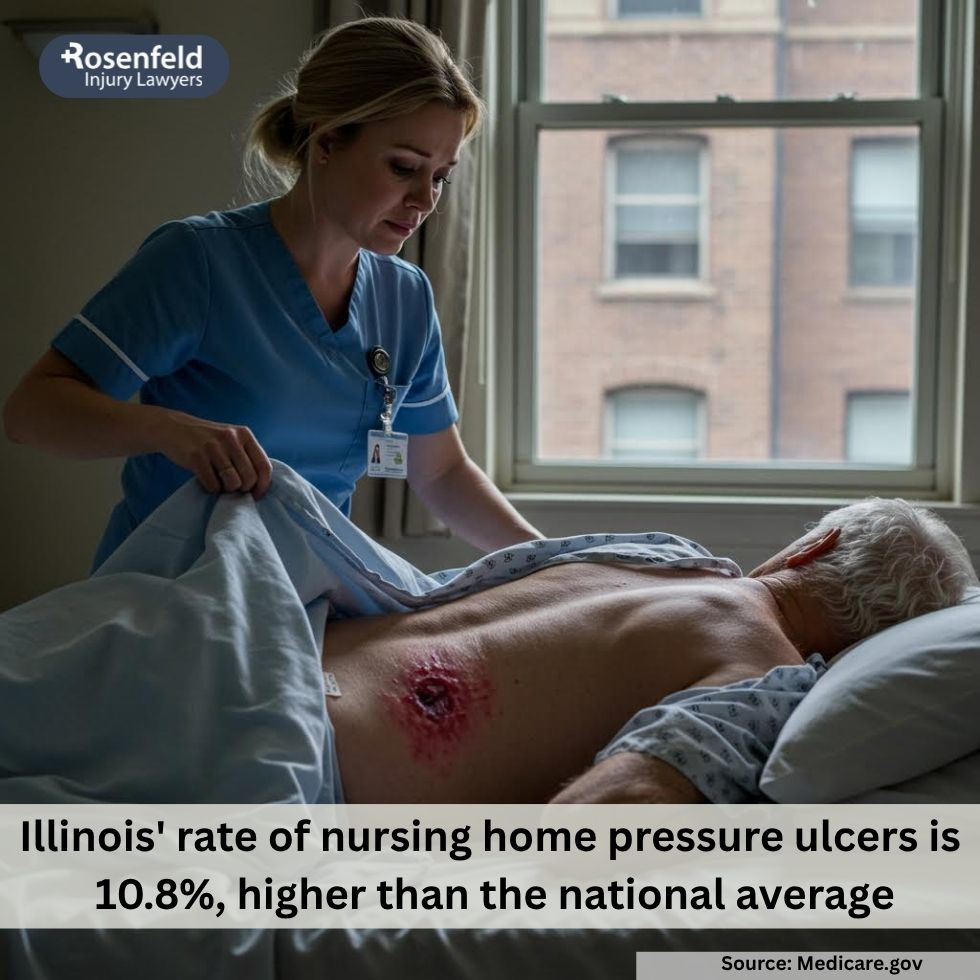
Based on Law.com’s VerdictSearch, the average payout for nursing home neglect cases involving bed sores is approximately $867,114, with settlements and verdicts typically ranging from $100,000 to $2,777,000.
Several factors can influence the final payout in a bed sore case:
Each case is unique, and a qualified Chicago bedsore lawyer can help assess the specific factors affecting your potential recovery.
$2,777,000 Jury Verdict – Fall, Traumatic Brain Injury, and Bed Sores Lead to Wrongful Death
Willie Green, age 66, was a resident at Southpoint Nursing and Rehabilitation Center in Chicago when he suffered an unwitnessed fall that resulted in a traumatic brain injury and a skull fracture. Green had dementia, syncope, and a seizure disorder. He died four months later at age 67 after developing bedsores and other complications during his decline. His son filed suit alleging the facility failed to provide standby ambulation assistance despite clear warning signs in medical records.
$1,000,000 Settlement – Stage IV Pressure Sores in Quadriplegic Patient Result in Death
Frank Sue, a quadriplegic man in his 70s, developed seven Stage IV pressure sores while residing at Alden Naperville Rehabilitation & Healthcare. His condition deteriorated under the care of the nursing home and two physicians who failed to coordinate care, assess wound severity, or take proper steps to prevent further injury. Sue died months later. His daughter filed suit for nursing home negligence and wrongful death.
$842,801 Jury Verdict – Fall in Nursing Home Causes Fractures, Loss of Mobility, and Bed Sores
Ida Brown, age 82 and living with dementia, was found on the floor of her room at Kenwood Healthcare Center in Chicago after an apparent fall–the fourth during her stay. She suffered fractures to her hip, pelvis, and right arm. The plaintiff argued the facility failed to implement proper fall precautions. Brown lost her ability to walk and later developed pressure sores due to immobility.
$700,000 Settlement – Dehydration, Underfeeding, and Bed Sores Result in Death of Alzheimer’s Patient
Walter Collins, age 71, entered Central Nursing Home in Chicago with Alzheimer’s disease. His estate claimed he was neglected, became dehydrated and underfed, and was left immobile for extended periods, causing pressure sores that led to sepsis and death. The nursing home denied wrongdoing, arguing his death was unrelated to care.
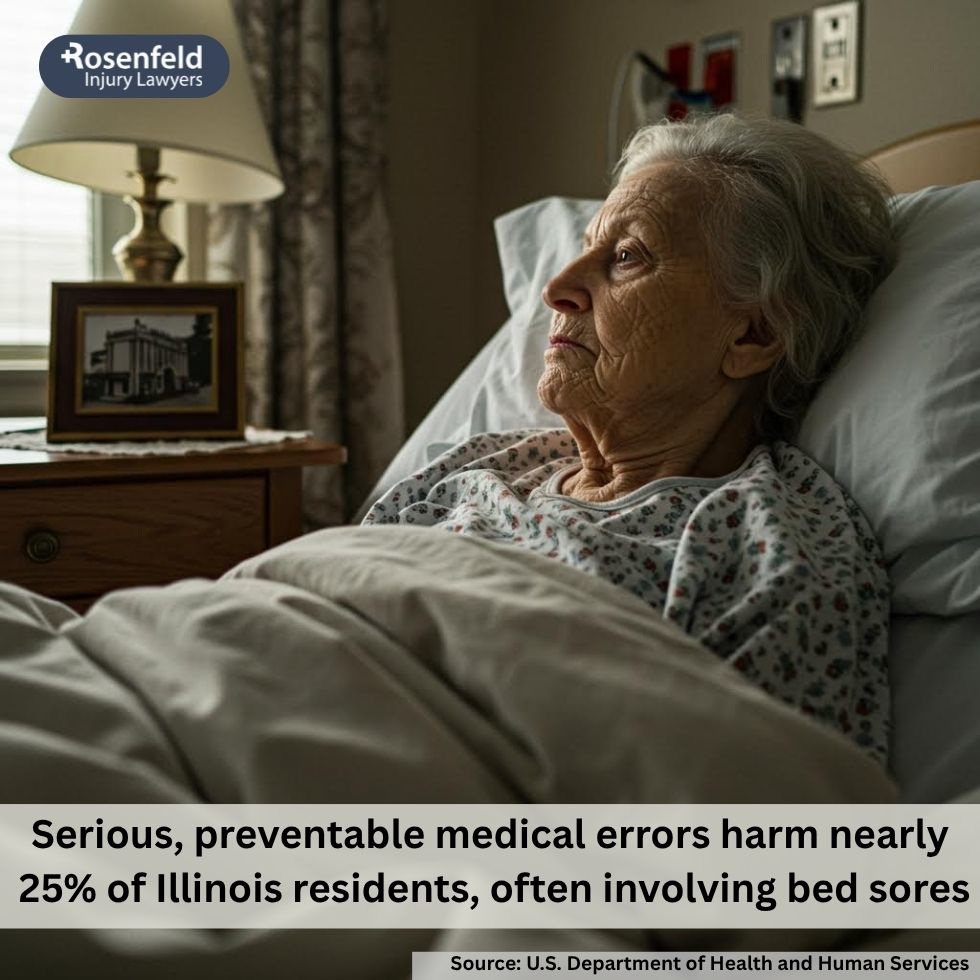
Cases involving bed sores in nursing homes are often complex and heavily defended by corporate owners and their insurance companies. Proving that a facility allowed a resident to develop bedsores requires a careful review of medical records, staffing logs, and care plans. An experienced Chicago bed sore lawyer knows how to uncover the truth, work with medical staff, and demonstrate how inadequate care caused serious harm. Our role is to hold nursing homes accountable, pursue just compensation for residents and their families, and take cases to trial when necessary to secure just results. This comprehensive approach often involves coordinating with a Chicago Nursing Home Sepsis Lawyer when a wound turns into a life-threatening blood infection, or investigating with a Chicago Nursing Home Chemical Restraints Lawyer if a resident was improperly over-sedated to the point of total immobility, directly causing the pressure sores to develop.
According to research cited by News-Medical, nursing homes reported less than 60 percent of severe pressure ulcers (stages 2–4) that resulted in hospitalizations for long-stay residents between 2011 and 2017. This underreporting means families may never know the full extent of how frequently bed sores occur, and it raises serious concerns about transparency and accountability in nursing home care.
Not every Chicago nursing home provides the consistent medical care residents deserve. Public reports show that some facilities repeatedly fail inspections, face steep fines, and struggle with dangerously high staff turnover–conditions that make residents more likely to suffer preventable bed sores. A few examples include:
At the federal level, the Nursing Home Reform Act of 1987 (OBRA) requires facilities that accept Medicare or Medicaid to provide adequate supervision, nutrition, hydration, and preventive measures such as repositioning and pressure relief devices. These standards are directly tied to preventing pressure sores.
In Harris v. Manor Healthcare Corp., the Illinois Supreme Court confirmed that residents and families can file private lawsuits for violations of OBRA, rather than relying only on the Illinois Department of Public Health (IDPH) to impose penalties. This means families dealing with facility-acquired bed sores have a direct legal path to pursue compensation.
Illinois also enforces the Illinois Nursing Home Care Act (210 ILCS 45/), one of the strongest resident-rights laws in the country. It allows victims to sue nursing homes for negligence when they fail to provide proper care that would have prevented pressure sores.
Other protections include the Abused and Neglected Long-Term Care Facility Residents Reporting Act (210 ILCS 30/), which requires suspected neglect–such as untreated bed sores–to be reported, and the Adult Protective Services Act (320 ILCS 20/), which provides statewide safeguards for vulnerable adults.
Together, these laws give families powerful tools to hold facilities accountable when bed sores develop due to nursing home abuse in the Chicago area.
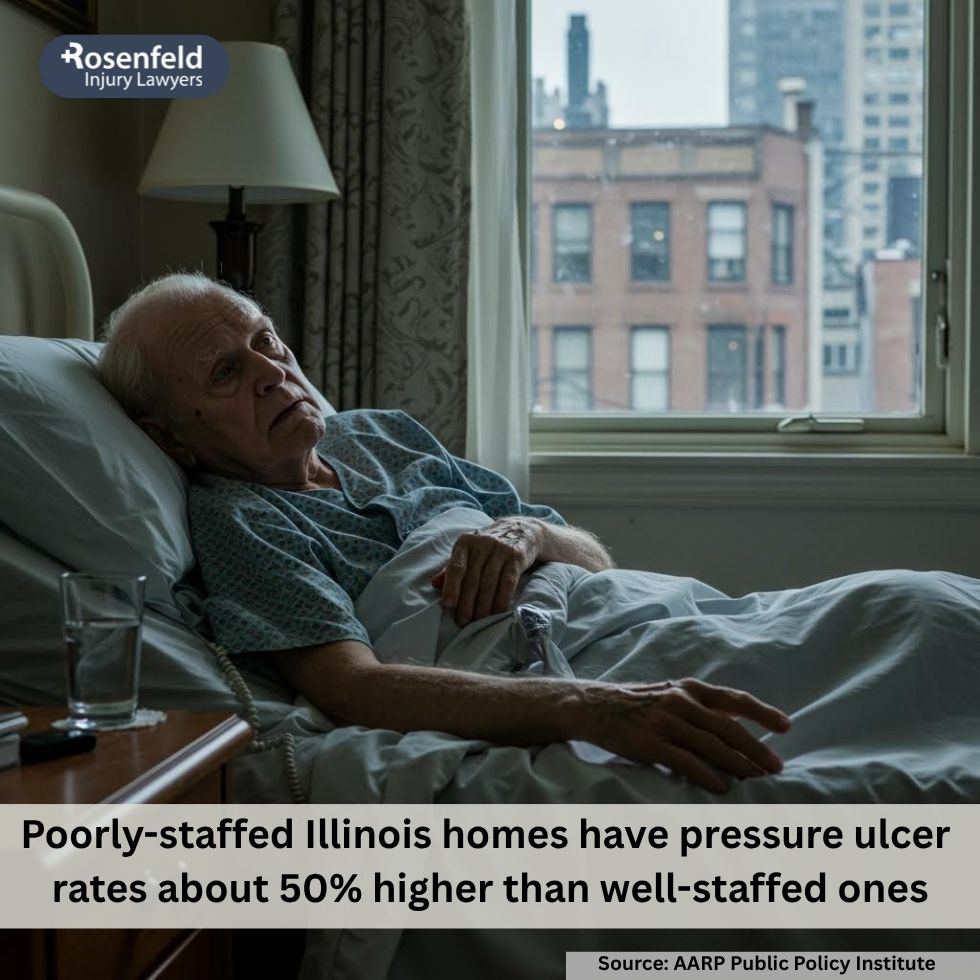
In Illinois, most lawsuits involving nursing home abuse–such as cases where a resident develops bed sores–must be filed within two years under 735 ILCS 5/13-202. If neglect leads to a resident’s death, the Illinois Wrongful Death Act (740 ILCS 180/) also sets a two-year deadline, beginning on the date of death.
However, the timeline isn’t always straightforward. Families don’t always discover the extent of neglect right away. Bed sores may be hidden, downplayed in medical records, or revealed only after hospitalization. In these situations, Illinois law recognizes the “discovery rule,” which can extend the filing deadline when the harm could not have reasonably been identified earlier.
In a Chicago bed sore lawsuit, one of the most important steps is determining exactly who is responsible for the neglect that allowed pressure sores to develop. Liability often begins with the nursing home facility itself. These corporations are required to provide enough staff, proper training, and adequate supervision to prevent residents from suffering bed sores. When they fail, they can be held accountable.
Individual nursing home staff members may also share responsibility if they ignored care plans, failed to reposition residents, or delayed medical attention. In addition, administrators and managers may be liable if they engaged in negligent hiring, failed to follow federal and state care standards, or ignored complaints about poor care.
Third parties, such as outside medical providers or contractors, can also be defendants if their neglect worsened the resident’s condition. Identifying all responsible parties ensures families have the strongest chance to pursue just compensation.
When a resident develops bed sores in a Chicago nursing home, the facility and its lawyers rarely admit responsibility. Instead, they often raise defenses designed to shift blame or minimize liability. One frequent argument is that pressure sores were unavoidable due to the resident’s pre-existing medical conditions, such as diabetes, dementia, or limited mobility. Facilities sometimes go further, claiming contributory negligence by suggesting the resident refused care or didn’t follow medical advice.
Another common defense is proximate causation, arguing that while a sore developed, it wasn’t the facility’s neglect that caused the injury, infection, or death. Nursing homes may also point to “compliance” with state or federal minimum standards, insisting that doing the bare minimum should protect them from liability.
Our bedsore lawyers counter these tactics with medical evidence, expert testimony, and facility records to show that adequate care would have prevented the sores and that residents are entitled to far more than minimal treatment. By anticipating these defenses, we strengthen cases and maximize compensation for victims and families.
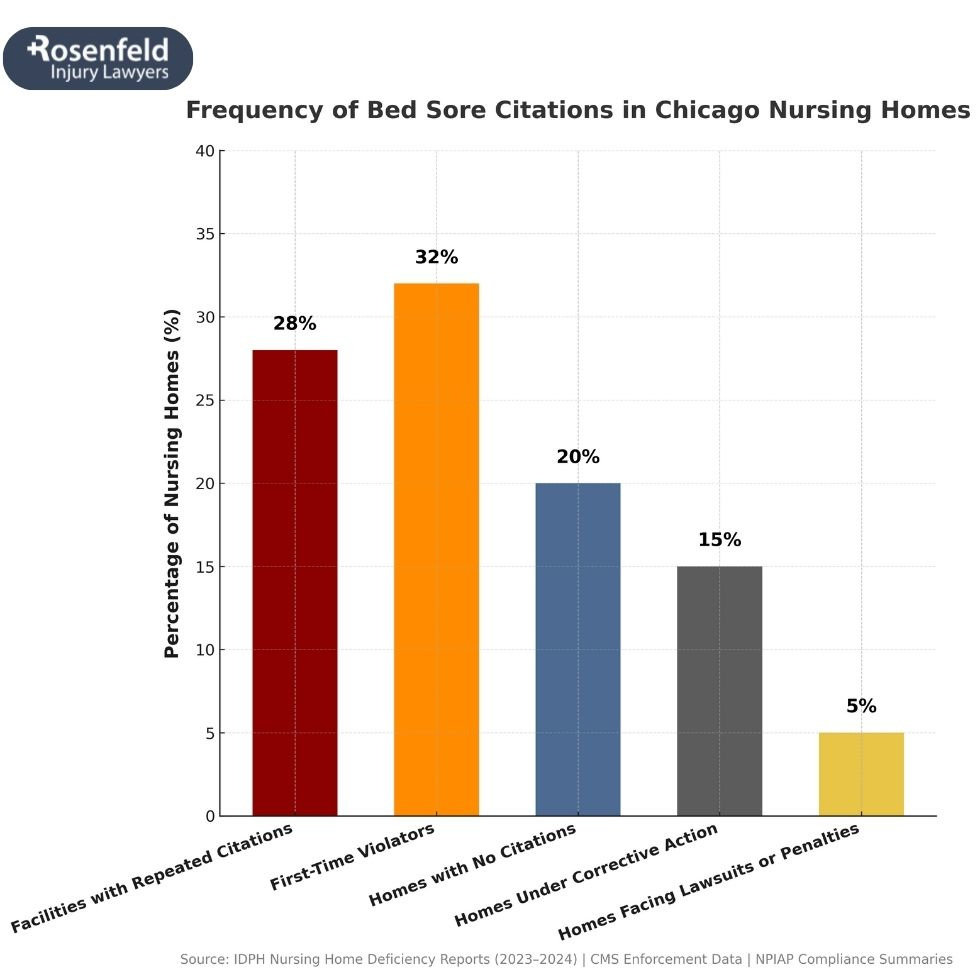
If your elderly loved one has developed bedsores in a nursing home, taking quick action can significantly improve the strength of your case. Start by documenting the injuries–photograph bed sores, note their location and stage, and record dates and staff interactions. Report the neglect to the Illinois Department of Public Health and Adult Protective Services to create an official record.
Be sure to preserve medical records, including hospital charts, wound care notes, and any communication with the nursing home. Finally, contact an experienced bedsore lawyer immediately to secure evidence and begin building a strong claim.
We start by investigating the facility, reviewing care plans, staffing records, and daily logs to uncover how the sores developed. We work closely with medical experts who can explain how improper care led to bed sores, infections, or even death. Our team also ensures the matter is reported to the Illinois Department of Public Health, creating an official record of neglect.
From there, we build strong cases in Cook County courts, preparing each one for trial to strengthen our position in settlement talks. Whether through negotiation or presenting evidence to a jury, our Chicago bed sore lawyers fight to secure full compensation for residents and their families. Our investigative reach extends to all forms of caregiver failure; whether you need a Chicago Nursing Home Choking Lawyer to review mealtime supervision protocols or a Chicago CILA Abuse Lawyer to protect a disabled adult in a Community Integrated Living Arrangement, we ensure no act of neglect goes unchallenged.
Elderly individuals, nursing home residents with limited mobility, and patients with medical conditions such as diabetes or vascular disease face the most significant risk for developing bedsores.
Bed sores most often form over bony areas where prolonged pressure restricts blood flow. Common locations include the heels, tailbone, hips, elbows, and shoulder blades.
If untreated, pressure sores can lead to serious complications such as infections, sepsis, osteomyelitis (bone infection), and even squamous cell carcinoma in chronic wounds. These serious medical conditions can cause significant pain, disability, or death.
Yes. Bed sores are widely recognized as a red flag for nursing home neglect. With proper care–regular turning, adequate nutrition, and timely medical treatment–they are largely preventable.
Most bed sores can be prevented with proper care. Prevention includes repositioning residents regularly, using pressure-relieving mattresses, ensuring hydration and nutrition, and conducting frequent skin checks.
If your loved one’s bed sores appear life-threatening or they’re experiencing a medical emergency, call 911 immediately. For suspected neglect or abuse, you should also file a report with the Illinois Department of Public Health or the 24-hour Adult Protective Services (APS) Hotline at 1-866-800-1409. You can also contact the Department of Family & Support Services at (312) 744-4016.
Yes. Hospitals, like nursing homes, have a duty to prevent bedsores through proper medical care. When patients develop bedsores during hospital stays, it may constitute medical neglect. A Chicago bedsore attorney can investigate the case and pursue compensation for medical costs, pain, and suffering.
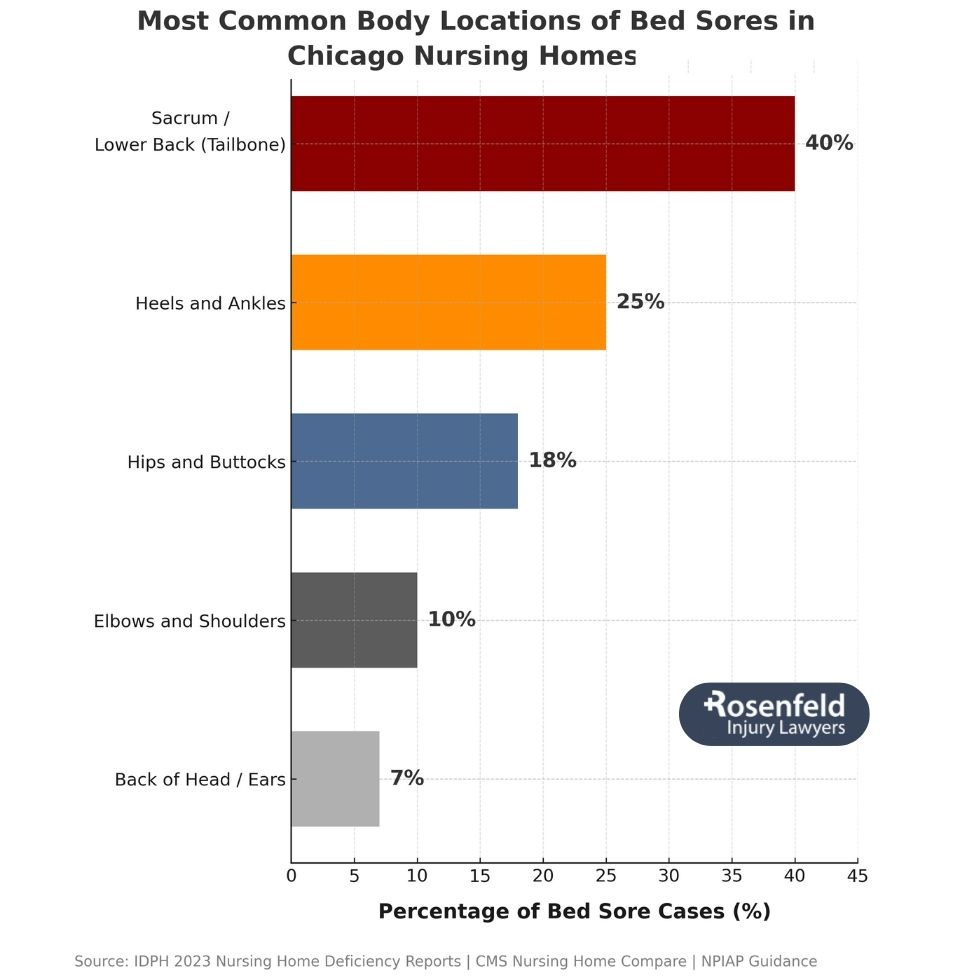
To succeed in a Chicago bed sore lawsuit, you must establish four key elements of negligence: duty, breach, causation, and damages. Nursing homes have a duty to provide proper care, including repositioning, skin checks, and wound prevention. A breach occurs when staff fail to meet these standards. Causation links the neglect directly to the development or worsening of pressure ulcers. Finally, damages cover the harm suffered, such as medical costs, pain, disability, or even wrongful death.
At Rosenfeld Injury Lawyers, our Chicago bed sore lawyers work on a contingency fee basis. That means you pay no upfront costs. Our fee is collected only if we recover compensation through settlement or verdict. We also provide a free case consultation to explain your legal options.

If your loved one has developed bedsores in a Chicago-area nursing home, it’s essential to act quickly. Early investigation allows us to preserve medical records, review facility logs, and hold negligent staff accountable. We offer a free consultation to review your situation, answer your questions, and explain your legal options.
At Rosenfeld Injury Lawyers, our Chicago personal injury lawyers have years of experience representing families across Cook County and throughout Illinois in cases involving pressure ulcers and nursing home abuse. In addition to medical neglect, we handle the most sensitive matters with the utmost discretion, including cases where a Chicago Nursing Home Sexual Abuse Lawyer is needed to represent residents who have been victimized in under-supervised facilities. Call us at (888) 424–5757 or fill out our contact form to schedule your free consultation.
Our downtown office, near the Richard J. Daley Center, Dirkson United States Courthouse, and the Chicago Workers’ Compensation Commission, offers convenient access from Aurora, Joliet, and Waukegan via I-90, I-94, and I-290.
225 W Wacker Dr #1660
Chicago, IL 60606
Phone: (847) 835-8895
Toll Free: (888) 424-5757
We also serve clients from Decatur, Evanston, Naperville , Schaumburg and throughout Illinois.
All content undergoes thorough legal review by experienced attorneys, including Jonathan Rosenfeld. With 25 years of experience in personal injury law and over 100 years of combined legal expertise within our team, we ensure that every article is legally accurate, compliant, and reflects current legal standards.